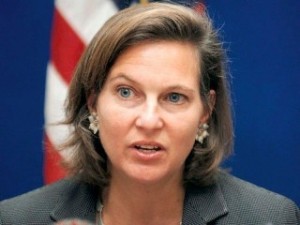Source: Consortium News
More than five years into his presidency, Barack Obama has failed to take full control over his foreign policy, allowing a bureaucracy shaped by long years of Republican control and spurred on by a neocon-dominated U.S. news media to frustrate many of his efforts to redirect America's approach to the world in a more peaceful direction.
But Obama deserves a big dose of the blame for this predicament because he did little to neutralize the government holdovers and indeed played into their hands with his initial appointments to head the State and Defense departments, Hillary Clinton, a neocon-leaning Democrat, and Robert Gates, a Republican cold warrior, respectively.
Occurring during the Winter Olympics in Sochi, Russia, the coup in Ukraine dealt an embarrassing black eye to Russian President Vladimir Putin, who had offended neocon sensibilities by quietly cooperating with Obama to reduce tensions over Iran and Syria, where the neocons favored military options.
Over the past several weeks, Ukrainian President Viktor Yanukovych was undercut by a destabilization campaign encouraged by Nuland and Pyatt and then deposed in a coup spearheaded by neo-Nazi militias. Even after Yanukovych and the political opposition agreed to an orderly transition toward early elections, right-wing armed patrols shattered the agreement and took strategic positions around Kiev.
Despite these ominous signs, Ambassador Pyatt hailed the coup as "a day for the history books." Most of the mainstream U.S. news media also sided with the coup, with commentators praising the overthrow of an elected government as "reform." But a few dissonant reports have pierced the happy talk by noting that the armed militias are part of the Pravy Sektor, a right-wing nationalist group which is often compared to the Nazis.
Thus, the Ukrainian coup could become the latest neocon-initiated "regime change" that ousted a target government but failed to take into account who would fill the void.
Some of these same American neocons pushed for the invasion of Iraq in 2003, not realizing that removing Saddam Hussein would touch off a sectarian conflict and lead to a pro-Iranian Shiite regime. Similarly, U.S. military intervention in Libya in 2011 eliminated Muammar Gaddafi but also empowered Islamic extremists who later murdered the U.S. ambassador and spread unrest beyond Libya's borders to nearby Mali.
One might trace this neocons' blindness to consequences back to Afghanistan in the 1980s when the Reagan administration supported Islamic militants, including Osama bin Laden, in a war against Soviet troops, only to have Muslim extremists take control of Afghanistan and provide a base for al-Qaeda to plot the 9/11 attacks against the United States.
Regarding Ukraine, today's State Department bureaucracy seems to be continuing the same anti-Moscow geopolitical strategy set during those Reagan-Bush years.
Robert Gates described the approach in his new memoir, Duty, explaining the view of President George H.W. Bush's Defense Secretary Dick Cheney: "When the Soviet Union was collapsing in late 1991, Dick wanted to see the dismantlement not only of the Soviet Union and the Russian empire but of Russia itself, so it could never again be a threat to the rest of the world."
Vice President Cheney and the neocons pursued a similar strategy during George W. Bush's presidency, expanding NATO aggressively to the east and backing anti-Russian regimes in the region including the hard-line Georgian government, which provoked a military confrontation with Moscow in 2008, ironically, during the Summer Olympics in China.
Obama's Strategy
As President, Obama has sought a more cooperative relationship with Russia's Putin and, generally, a less belligerent approach toward adversarial countries. Obama has been supported by an inner circle at the White House with analytical assistance from some elements of the U.S. intelligence community.
But the neocon momentum at the State Department and from other parts of the U.S. government has continued in the direction set by George W. Bush's neocon administration and by neocon-lite Democrats who surrounded Secretary of State Clinton during Obama's first term.
The two competing currents of geopolitical thinking -- a less combative one from the White House and a more aggressive one from the foreign policy bureaucracy -- have often worked at cross-purposes. But Obama, with only a few exceptions, has been unwilling to confront the hardliners or even fully articulate his foreign policy vision publicly.
For instance, Obama succumbed to the insistence of Gates, Clinton and Gen. David Petraeus to escalate the war in Afghanistan in 2009, though the President reportedly felt trapped into the decision which he soon regretted. In 2010, Obama backed away from a Brazilian-Turkish-brokered deal with Iran to curtail its nuclear program after Clinton denounced the arrangement and pushed for economic sanctions and confrontation as favored by the neocons and Israel.
(Note: You can view every article as one long page if you sign up as an Advocate Member, or higher).






